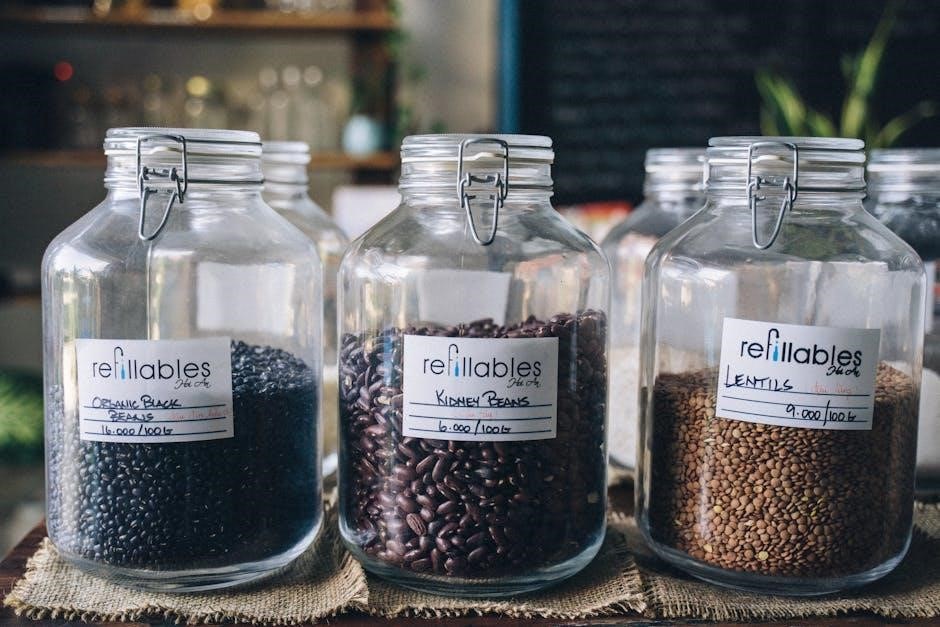
zero carb foods list pdf
Zero-carb foods are a dietary choice focusing on animal products and healthy fats, excluding sugars and starches, promoting ketosis and weight loss through reduced carbohydrate intake․

What Are Zero Carb Foods?
Zero-carb foods are items naturally containing minimal to no carbohydrates, such as meats, fish, eggs, and healthy oils․ They exclude sugars, starches, and fiber, focusing on protein and fats, ideal for low-carb diets like keto․

Benefits of a Zero Carb Diet
A zero-carb diet promotes weight loss, improves blood sugar control, and increases energy levels by eliminating carbohydrates and focusing on protein and fats․
3․1 Weight Loss
A zero-carb diet accelerates weight loss by eliminating sugars and starches, shifting the body to burn fat for energy․ High-protein foods like meat and fish support muscle retention, boosting metabolism․ Reduced insulin levels and suppressed appetite further enhance fat burning, making it an effective approach for shedding pounds and improving overall body composition․
3․2 Improved Blood Sugar Control
A zero-carb diet stabilizes blood sugar levels by eliminating carbohydrates, which are the primary source of glucose․ This reduction minimizes insulin spikes, improving insulin sensitivity and reducing the risk of type 2 diabetes․ With no dietary sugars, the body maintains better glucose regulation, promoting long-term health benefits for those managing or preventing blood sugar-related conditions․
3․3 Increased Energy Levels
A zero-carb diet often leads to increased energy levels as the body transitions from relying on glucose to burning fat for fuel․ This metabolic shift, known as ketosis, provides a steady energy supply, reducing the energy crashes associated with carbohydrate intake․ Many individuals report enhanced mental clarity and sustained vitality throughout the day․
List of Zero Carb Foods
A zero-carb diet focuses on animal products and healthy fats․ Categories include meats, fish, dairy, oils, and low-carb vegetables, providing a balanced approach to significantly reducing carbohydrate intake․
4․1 Meat and Poultry
Fatty cuts of beef, pork, lamb, and organ meats are ideal for a zero-carb diet․ Chicken and turkey, especially when skin is included, are excellent sources of protein and healthy fats, aligning perfectly with low-carb dietary goals․
4․1․1 Beef
Beef is a cornerstone of zero-carb diets, offering rich protein and healthy fats․ Fatty cuts like ribeye and brisket are ideal, containing no carbs․ Beef supports ketosis and provides essential nutrients, making it a versatile and satisfying choice for low-carb meals․
4․1․2 Pork
Pork is another excellent zero-carb option, offering diverse cuts rich in protein and fat․ Pork belly, bacon, and ground pork are ideal choices, with no carbs and high fat content, making them perfect for maintaining ketosis and enhancing the flavor of low-carb meals․
4․1․3 Lamb
Lamb is a nutrient-rich, zero-carb meat option, providing high-quality protein and healthy fats․ Cuts like ground lamb or lamb chops are excellent choices for a low-carb diet, offering rich flavor and a boost of essential nutrients without any carbohydrates․
4․1․4 Organ Meats
Organ meats, such as liver, heart, and kidneys, are highly nutritious zero-carb options․ Packed with vitamins and minerals, they provide essential nutrients like iron and B vitamins without any carbohydrate content, making them a valuable addition to a zero-carb diet․
4․2 Fish and Seafood
Fish and seafood are excellent zero-carb options, offering high-quality protein and essential nutrients․ Fatty fish like salmon and mackerel are rich in omega-3 fatty acids, while shellfish such as shrimp and lobster provide vital minerals․ These foods are naturally low in carbs, making them a great choice for those adhering to a zero-carb or keto diet․
4․2․1 Fatty Fish
Fatty fish like salmon, mackerel, and sardines are zero-carb staples, rich in omega-3 fatty acids․ They support heart health and provide essential nutrients without any carbohydrates, making them ideal for a zero-carb or ketogenic diet․
4․2․2 Shellfish
Shellfish, including shrimp, crab, and lobster, are excellent zero-carb options․ Low in carbs and high in protein, they offer essential nutrients like zinc and selenium․ These seafood choices are versatile and fit seamlessly into a zero-carb diet, providing both flavor and nutritional benefits without compromising carb intake limits․
4․2․3 Tuna and Salmon
Tuna and salmon are zero-carb seafood options rich in protein and omega-3 fatty acids․ Fresh or canned in water, they provide essential nutrients without carbs․ These fish support heart health and are versatile in salads, meals, or as snacks, making them ideal for a zero-carb diet while offering numerous health benefits like reduced inflammation․
4․3 Dairy Products
Dairy products like cheese, eggs, and Greek yogurt are excellent zero-carb options․ Rich in protein and fats, they support satiety and provide essential nutrients․ Unsweetened, nonfat yogurt and cheese varieties are particularly popular, offering versatility in meals while adhering to a zero-carb lifestyle․ These foods are ideal for maintaining a balanced diet without compromising on taste or nutrition․
4․3․1 Cheese
Cheese is a prime zero-carb option, rich in fats and containing zero carbs․ Varieties like cheddar, mozzarella, and feta are ideal․ Soft cheeses, such as cream cheese, add versatility to meals․ Cheese supports satiety and provides essential nutrients, making it a perfect fit for a zero-carb lifestyle․
4․3․2 Eggs
Eggs are a versatile zero-carb food, packed with protein and healthy fats․ One large egg contains less than 1 gram of carbs, making them ideal for breakfast or snacks․ Eggs support weight loss and are rich in essential nutrients, fitting seamlessly into a zero-carb diet plan․
4․3․3 Greek Yogurt
Greek yogurt is a low-carb dairy option, with unsweetened varieties containing nearly zero carbs․ It’s high in protein, supporting muscle growth and satiety․ Opt for unflavored, full-fat versions to align with a zero-carb diet, enhancing both nutrition and flavor in meals or snacks․
4․4 Low-Carb Vegetables
Low-carb vegetables are essential for a balanced diet, offering fiber and nutrients․ Leafy greens like spinach, kale, and lettuce are ideal, while cruciferous options such as broccoli, cauliflower, and Brussels sprouts add variety․ These veggies keep net carbs low, making them perfect for zero-carb meal plans and supporting overall health without compromising dietary goals․
4․4․1 Leafy Greens
Leafy greens like spinach, kale, and lettuce are rich in nutrients and low in carbs, making them ideal for zero-carb diets․ These greens provide essential vitamins and minerals while maintaining minimal carb content, supporting a healthy and balanced dietary approach without sacrificing flavor or nutritional value․
4․4․2 Cruciferous Vegetables
Cruciferous vegetables, such as broccoli, cauliflower, and Brussels sprouts, are low in carbs and high in fiber․ They provide essential nutrients like vitamin C and antioxidants, supporting overall health․ These vegetables are versatile, fitting seamlessly into zero-carb meal plans while offering numerous health benefits and a variety of culinary options․
4․4․3 Other Low-Carb Options
Beyond leafy greens and cruciferous vegetables, other low-carb options include asparagus, zucchini, and cucumbers․ These vegetables are rich in nutrients and antioxidants, making them ideal for a zero-carb diet․ They add variety to meals while keeping carb intake minimal, supporting weight loss and overall health goals effectively․
4․5 Healthy Oils and Fats
Healthy oils and fats are essential for a zero-carb diet, providing energy and aiding in nutrient absorption․ Olive oil, coconut oil, and avocado oil are popular choices, rich in beneficial fats and antioxidants․ These oils enhance flavor and support overall health without adding carbs, making them ideal for cooking and dressings in a low-carb lifestyle․
4․5․1 Olive Oil
Olive oil is a cornerstone of healthy fats in a zero-carb diet․ It contains zero carbs and is rich in monounsaturated fats, which support heart health․ Use it for cooking, dressings, or as a finishing touch for dishes to add flavor and nutritional value without compromising your low-carb goals․ Choose high-quality, extra-virgin options for optimal benefits․
4․5․2 Coconut Oil
Coconut oil is a versatile, zero-carb fat source with unique health benefits․ It contains medium-chain triglycerides (MCTs), which are easily absorbed and converted into energy․ Use it for cooking, baking, or as a supplement․ Its high smoke point makes it ideal for frying, while its flavor enhances dishes without adding carbs, perfect for a zero-carb lifestyle․
4․5․3 Avocado Oil
Avocado oil is a healthy, zero-carb option, rich in monounsaturated fats and antioxidants․ It has a mild, buttery flavor and a high smoke point, making it excellent for cooking and dressings․ Its heart-healthy properties and versatility make it a great addition to a zero-carb diet, enhancing meals without adding carbohydrates or harmful fats․
4․6 Snacks
Zero-carb snacks are essential for satisfying cravings without breaking dietary rules․ Popular options include nuts, seeds, and low-carb snack bars․ These snacks are high in protein and healthy fats, providing sustained energy․ Portion control is key, as nuts can be calorie-dense․ They offer a convenient and delicious way to stay on track with a zero-carb lifestyle․
4․6․1 Nuts and Seeds
Nuts and seeds are excellent zero-carb snacks, offering healthy fats and protein․ Almonds, walnuts, chia seeds, and flaxseeds are popular choices․ They provide essential nutrients and keep you full․ However, portion control is crucial as they can be calorie-dense․ Always choose unsalted, unsweetened varieties to avoid hidden carbs and added sugars․
4․6․2 Low-Carb Snack Bars
Low-carb snack bars are convenient options for those adhering to a zero-carb diet․ Look for bars made with wholesome ingredients like nuts, seeds, and healthy oils, ensuring minimal net carbs․ Avoid bars with added sugars, artificial flavors, or high-carb fillers․ Always check the nutrition label to confirm carb content and choose bars with fewer than 5 grams of net carbs per serving․
4․7 Beverages

Zero-carb beverages are essential for hydration without compromising dietary goals․ Water is the top choice, followed by herbal teas like peppermint, chamomile, and green tea․ Low-carb protein shakes and unsweetened almond milk are also great options․ Avoid sugary drinks, sodas, and juices, as they contain high carbs․ Staying hydrated is crucial for overall health and metabolic function․
4․7․1 Water
Water is the ultimate zero-carb beverage, with no calories, sugars, or artificial additives․ It’s essential for hydration, digestion, and flushing out toxins․ Drinking enough water supports weight loss and overall health, making it a cornerstone of any zero-carb diet․ Aim for at least eight glasses daily to stay optimally hydrated and maintain bodily functions effectively․
4․7․2 Herbal Teas
Herbal teas are a refreshing, zero-carb choice, offering various flavors without added sugars or artificial ingredients․ Options like peppermint, chamomile, and hibiscus provide antioxidants and support digestion․ Many herbal teas are naturally caffeine-free, making them suitable for all times of the day․ They complement a zero-carb lifestyle by adding variety and health benefits to your beverage options․
4․7․3 Low-Carb Protein Shakes
Low-carb protein shakes are convenient and nutritious, ideal for those on a zero-carb diet․ Made with protein powders like whey or collagen, they offer essential amino acids without the carbs․ Flavored with natural sweeteners or herbs, they support muscle growth and satisfaction, perfect for post-workout recovery or as a quick, guilt-free meal replacement․

Tips for Maintaining a Zero Carb Diet
Plan meals, shop smartly, and dining out wisely to sustain a zero-carb lifestyle․ Track macros and stay hydrated to avoid common pitfalls and maintain consistency․
5․1 Meal Planning
Effective meal planning involves creating a weekly schedule with zero-carb options like meats, fish, and low-carb vegetables․ Use a grocery list to ensure availability of keto-friendly ingredients, avoiding hidden carbs and focusing on whole foods to maintain consistency and nutritional balance throughout the day․
5․2 Grocery Shopping
Grocery shopping for a zero-carb diet requires focusing on animal products, healthy oils, and low-carb vegetables․ Stick to whole foods, avoiding processed items with hidden carbs․ Plan your list around meats, fish, eggs, and fats, ensuring each purchase aligns with your dietary goals for a successful and sustainable zero-carb lifestyle․
5․3 Dining Out
Dining out on a zero-carb diet requires careful choices․ Opt for grilled meats, fish, or seafood, avoiding sauces and breading․ Request vegetables like broccoli or spinach instead of high-carb sides․ Be cautious of hidden carbs in dressings or condiments․ Communicate with your server to ensure your meal aligns with your dietary goals for a satisfying and compliant dining experience․

Common Mistakes to Avoid
Common mistakes include consuming hidden carbs, overeating protein, and neglecting fiber intake, which can hinder progress and cause potential health issues over time․
6․1 Hidden Carbs in Foods
Many seemingly zero-carb foods contain hidden carbs, such as sauces, condiments, and processed meats․ Always check labels and opt for whole, unprocessed foods to avoid unintentional carb intake․
6․2 Overconsumption of Protein
Excessive protein intake can convert to glucose, hindering ketosis․ Balance protein portions with fats to maintain dietary goals and ensure optimal metabolic state․ Moderation is key for a zero-carb regimen․
6․3 Neglecting Fiber Intake
Low-carb diets often lack sufficient fiber, leading to digestive issues like constipation․ Incorporate fiber-rich, low-carb vegetables and nuts to maintain gut health without compromising dietary goals․
Incorporating Zero Carb Foods into a Keto Diet
Zero-carb foods seamlessly integrate into a keto diet, enhancing fat adaptation and ketosis․ Focus on animal products and healthy oils to maintain ketosis while avoiding hidden carbs․
7․1 Understanding Ketosis
Ketosis is a metabolic state where the body burns fat for energy instead of carbs, producing ketones․ Zero-carb foods are ideal for achieving ketosis, as they minimize glucose availability, forcing the body to rely on fat stores and promoting weight loss and improved blood sugar control․
7․2 Combining with Keto-Friendly Foods
Zero-carb foods seamlessly integrate with keto-friendly options, maximizing ketosis benefits․ Pairing meats, fish, and healthy oils with low-carb vegetables enhances fat adaptation and sustains energy levels, aligning with keto principles for optimal metabolic health and weight management․

7․3 Sample Keto Meal Plans
Keto meal plans emphasize zero-carb foods, featuring breakfast options like eggs and avocado, lunches with fatty fish or meats, and dinners including steak or poultry․ Snacks such as nuts or cheese maintain ketosis, ensuring high fat and minimal carb intake for sustained energy and fat adaptation․